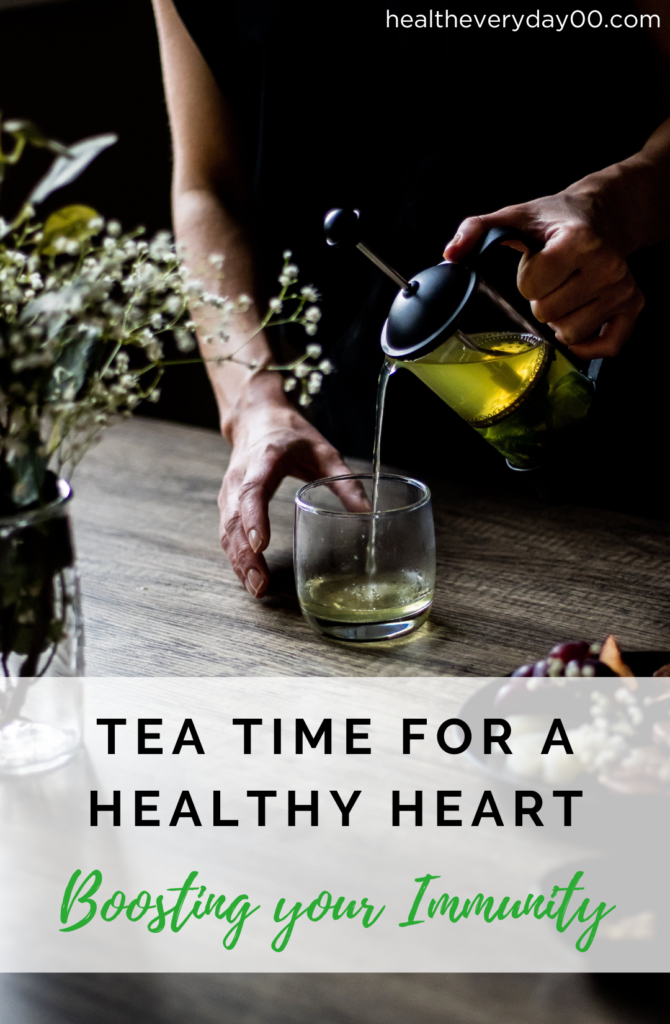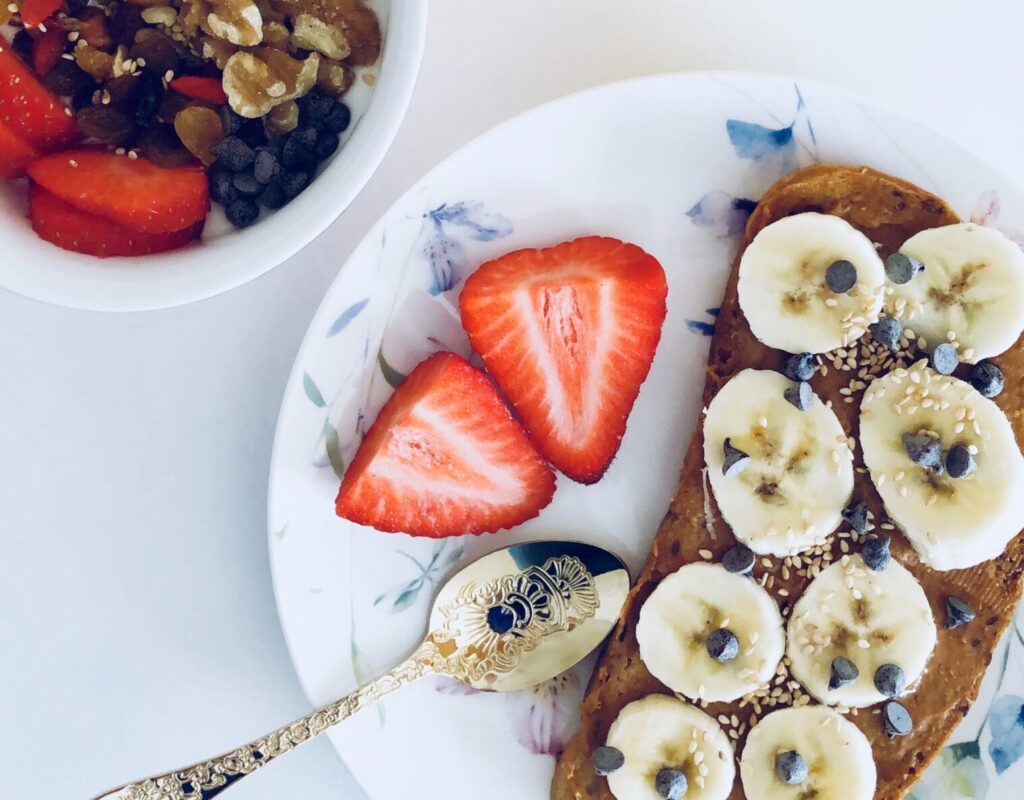Tea Time for a Healthy Heart: Boosting Immunity

Introduction
Tea has transcended its role as a mere beverage; it’s a timeless elixir that holds the key to a healthy heart and a fortified immune system. In this journey, we’ll uncover the various types of tea and how each contributes to our well-being.
1. Types of Tea
Embark on a journey through the diverse world of tea, each variety offering unique health benefits and a sensory experience like no other.
Green Tea
- Antioxidant Powerhouse: Bursting with catechins, green tea acts as a formidable antioxidant, combating free radicals linked to heart disease and bolstering the immune system.
- Cardiovascular Support: Studies suggest that regular consumption of green tea may contribute to lower levels of bad cholesterol, reducing the risk of heart-related issues.
- Weight Management: Green tea’s metabolism-boosting properties make it a companion for those on a journey to manage weight, indirectly benefiting heart health.
Black Tea
- Flavonoid Richness: Black tea is a treasure trove of flavonoids, compounds known for their potential to improve heart health by enhancing blood vessel function.
- Heart-Friendly Properties: Regular consumption may contribute to improved heart health by promoting healthy blood pressure levels and reducing the risk of arterial stiffness.
- Immune System Enhancement: Theaflavins, unique to black tea, offer immune-boosting properties, making it a valuable addition to your wellness routine.
Herbal Infusions
- Caffeine-Free Bliss: Herbal teas, ranging from calming chamomile to invigorating peppermint, provide a caffeine-free option suitable for any time of the day.
- Specific Health Benefits: Each herbal infusion brings its own set of health advantages; for instance, ginger tea is renowned for its anti-inflammatory properties, contributing to heart health.
- Personalized Wellness: Tailor your tea selection to match your wellness goals, whether it’s relaxation, digestion, or overall vitality.
Explore the nuances of each tea variety and discover the one that aligns perfectly with your health and lifestyle aspirations.
2. Heart Health
Tea isn’t just a warm embrace; it’s a friend to your heart. Understanding the intricate ways in which tea influences cardiovascular well-being is key to unlocking its full potential.
Cardioprotective Antioxidants
- Powerful Catechins: Green tea, in particular, boasts high levels of catechins, potent antioxidants that may help protect the heart by neutralizing harmful free radicals.
- Flavonoids in Black Tea: Black tea contributes to heart health through its flavonoid content, which supports the function of blood vessels and helps maintain a healthy cardiovascular system.
Blood Pressure Regulation
- Green Tea’s Impact: Some studies suggest that the regular consumption of green tea may contribute to the maintenance of healthy blood pressure levels, reducing the risk of hypertension.
- Black Tea’s Role: The flavonoids in black tea have been linked to improvements in blood pressure regulation, promoting optimal cardiovascular function.
Cholesterol Management
- Green Tea’s Influence: Green tea may aid in lowering levels of LDL (low-density lipoprotein) cholesterol, commonly known as “bad” cholesterol, reducing the risk of heart-related issues.
- Flavonoids in Action: The flavonoids in black tea have been associated with improvements in cholesterol profiles, potentially lowering the risk of atherosclerosis.
Arterial Health
- Antioxidant Powerhouse: Bursting with catechins, green tea acts as a formidable antioxidant, combating free radicals linked to heart disease and bolstering the immune system.
- Cardiovascular Support: Studies suggest that regular consumption of green tea may contribute to lower levels of bad cholesterol, reducing the risk of heart-related issues.
- Weight Management: Green tea’s metabolism-boosting properties make it a companion for those on a journey to manage weight, indirectly benefiting heart health.
3. Immunity Boost
Unlocking the immune-boosting potential of tea involves understanding the intricate interplay between its compounds and our body’s defense mechanisms. Dive into the science behind how tea acts as a shield, fortifying your immune system against external threats.
Antioxidant Arsenal
- Tea’s Rich Polyphenols: The polyphenols in tea, such as catechins and theaflavins, act as potent antioxidants. These compounds neutralize free radicals, potentially reducing oxidative stress and supporting overall immune function.
- Green Tea’s ECGC Boost: Epigallocatechin gallate (EGCG) in green tea is particularly noteworthy for its immune-enhancing properties, contributing to the body’s defense against infections.
Anti-Inflammatory Allies
- Ginger and Turmeric Infusions: Herbal teas like ginger and turmeric are celebrated for their anti-inflammatory properties. These can aid in reducing inflammation in the body, a key component of a robust immune response.
- Chamomile Calm: Chamomile tea, known for its soothing properties, may indirectly support immunity by promoting relaxation and reducing stress, a factor that can impact immune function.
Probiotic Support
- Fermented Teas: Certain teas, like kombucha and fermented herbal blends, contain probiotics that promote a healthy gut microbiome. A balanced gut contributes to a strengthened immune system.
Vitamin and Mineral Contribution
- Tea’s Micronutrients: Tea is a source of essential vitamins and minerals, including vitamin C, zinc, and manganese. While not a replacement for a varied diet, these micronutrients play a role in immune function.
Hydration and Immunity
- Water Content in Tea: Proper hydration is crucial for a well-functioning immune system. Tea, as a hydrating beverage, supports overall health and aids in the optimal functioning of bodily processes.
Consistent Consumption
- Incorporate Tea Daily: Consistency is key. Regular, moderate tea consumption ensures a steady intake of immune-boosting compounds, providing ongoing support for your body’s defense mechanisms.
Herbal Combinations
- Synergistic Blends: Experiment with herbal combinations that synergize immune-supporting ingredients. Pairing echinacea with elderberry or peppermint with thyme can create flavorful blends with added health benefits.
Understanding how tea contributes to immunity empowers you to make informed choices for your well-being. By embracing tea as a daily ritual, you fortify your body, creating a resilient shield against external challenges.
4. Brewing Tips
Brewing the perfect cup of tea is an art that extends beyond mere preparation; it’s about unlocking the full spectrum of health benefits. Follow these brewing tips to ensure your tea not only tantalizes your taste buds but also nourishes your heart and boosts your immunity.
Quality Matters
- Choose Premium Leaves: Opt for high-quality tea leaves to maximize the health benefits. Whether it’s loose leaves or tea bags, prioritize freshness and authenticity for a truly enriching experience.
- Explore Varieties: Experiment with different types of tea to discover the flavors that resonate with you. From delicate green teas to robust black varieties, each cup offers a unique health profile.
Water Temperature and Steeping Time
- Green Tea Precision: Green tea requires a gentler touch. Use water heated to around 160–180°F (71–82°C) and steep for 2–3 minutes to preserve delicate flavors and antioxidants.
- Bold Black Tea: For black tea, opt for hotter water (around 200–212°F or 93–100°C) and a slightly longer steeping time of 3–5 minutes to extract its full-bodied richness.
Avoid Overbrewing
- Bitterness Alert: Overbrewing can lead to bitterness, diminishing the tea-drinking experience. Keep an eye on the clock, especially with green teas, to savor a well-balanced cup without the unwanted bitterness.
Additives and Sweeteners
- Minimalist Approach: To fully appreciate the health benefits, consider consuming tea without excessive additives or sweeteners. If desired, use natural sweeteners sparingly to maintain the tea’s integrity.
Brewing Vessels
- Teapot or Infuser: Invest in a good-quality teapot or infuser to allow the leaves to unfurl and release their full flavor. This enhances the overall tea-drinking experience while preserving health-promoting compounds.
Experiment with Herbal Infusions
- Play with Blends: Herbal infusions offer a canvas for creativity. Experiment with blends like chamomile and lavender for relaxation or ginger and turmeric for an anti-inflammatory boost.
Mindful Tea Drinking
- Create a Ritual: Treat tea preparation and consumption as a mindful ritual. Set aside time to enjoy the process, inhale the aromatic steam, and savor each sip with intention for a holistic experience.
By mastering the art of brewing, you not only elevate the sensory pleasure of tea but also unlock its full potential to enhance heart health and boost immunity.
5. Tea and Lifestyle
Tea isn’t just a beverage; it’s a lifestyle choice that can transform daily routines into moments of self-care and well-being. Explore the myriad ways in which integrating tea into your lifestyle can enhance not only your physical health but also your mental and emotional wellness.
Mindful Mornings
- Morning Ritual: Start your day with a cup of your favorite tea. The ritual of preparing and savoring tea sets a positive tone, fostering a mindful mindset for the day ahead.
Afternoon Respite
- Tea Breaks: Incorporate short tea breaks into your afternoon. Stepping away from tasks to enjoy a cup of tea can be a rejuvenating pause, enhancing focus and productivity.
Evening Unwind
- Relaxation Ritual: Wind down in the evening with a calming herbal infusion like chamomile or lavender. The act of slowing down and enjoying a warm cup signals to your body that it’s time to relax.
Tea and Social Connections
- Tea Gatherings: Invite friends or family for a tea gathering. Sharing tea fosters social connections, creating a space for meaningful conversations and bonding.
Tea and Meditation
- Mindful Sipping: Turn tea-drinking into a mindful practice. Engage your senses by sipping slowly, savoring the flavors, and being present in the moment. This simple act can be a form of meditation.
Tea Blends for Well-being:
- Personalized Blends: Create your own tea blends to address specific wellness goals. Whether it’s a blend for relaxation or an energy-boosting mix, tailor your teas to suit your lifestyle needs. Tea and Hydration Goals.
- Hydrate Deliciously: For those aiming to increase water intake, incorporating herbal teas into your hydration routine adds flavor without calories, making it easier to meet daily hydration goals.
- Culinary Adventures: Explore using tea in cooking and mixology. From tea-infused recipes to creating unique tea-based cocktails, incorporate the versatility of tea into your culinary adventures.
Tea and Technology Detox
- Unplug with Tea: Use tea time as an opportunity to disconnect from screens. Enjoying a cup of tea away from electronic devices promotes a digital detox, contributing to mental well-being.
Tea as a Symbol of Self-Care
- Nourish the Soul: Consider your tea time as a form of self-care. The act of preparing and enjoying tea becomes a ritual that nurtures not just the body but also the soul.
Embrace tea as more than a drink; let it weave into the fabric of your lifestyle, enhancing moments big and small with its comforting presence.
6. Myth Busting
Tea has long been shrouded in myths and misconceptions. Let’s dispel the fog and shed light on the truths behind common beliefs, ensuring you can fully enjoy your tea without being hindered by unfounded notions.
Myth 1: All Teas Are Equal
- Reality: Different teas offer distinct health benefits. While green tea is renowned for antioxidants, black tea boasts flavonoids, and herbal infusions provide unique wellness advantages. Variety matters!
Myth 2: All Teas Contain the Same Amount of Caffeine
- Reality: Caffeine levels vary. Green tea generally has less caffeine than black tea, offering a milder option. Herbal teas are often caffeine-free. Tailor your tea choice to your caffeine sensitivity.
Myth 3: Tea Causes Dehydration
- Reality: Tea contributes to daily hydration. While it contains caffeine, the water content offsets its diuretic effects. Tea hydrates as it delights your taste buds, making it a suitable part of your fluid intake.
Myth 4: Tea Stains Teeth Significantly
- Reality: Tea can cause mild staining, but it’s less severe than coffee. Regular dental care mitigates staining effects. Opt for lighter teas or rinse your mouth with water after consumption.
Myth 5: Tea Is Harmful During Pregnancy
- Reality: Moderate consumption is generally safe during pregnancy. However, caffeine levels should be monitored. Consult with a healthcare professional to determine individual suitability.
By debunking these myths, you can approach your tea experience with clarity, making informed choices that align with your health goals and preferences.
Conclusion
Incorporating tea into your daily routine isn’t just a beverage choice; it’s a commitment to your heart and immune health. Embrace the ritual of tea time as a holistic approach to wellness.



